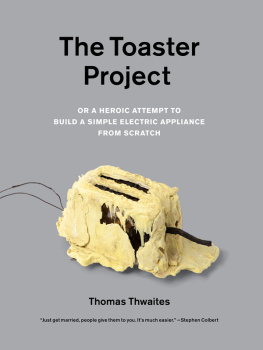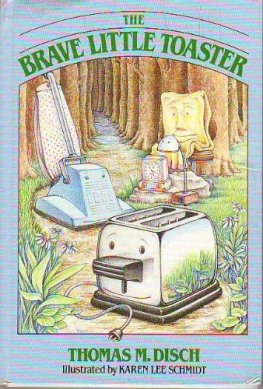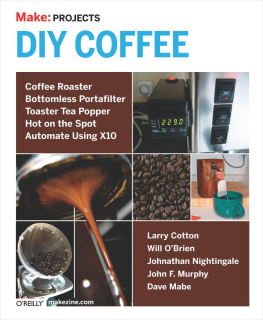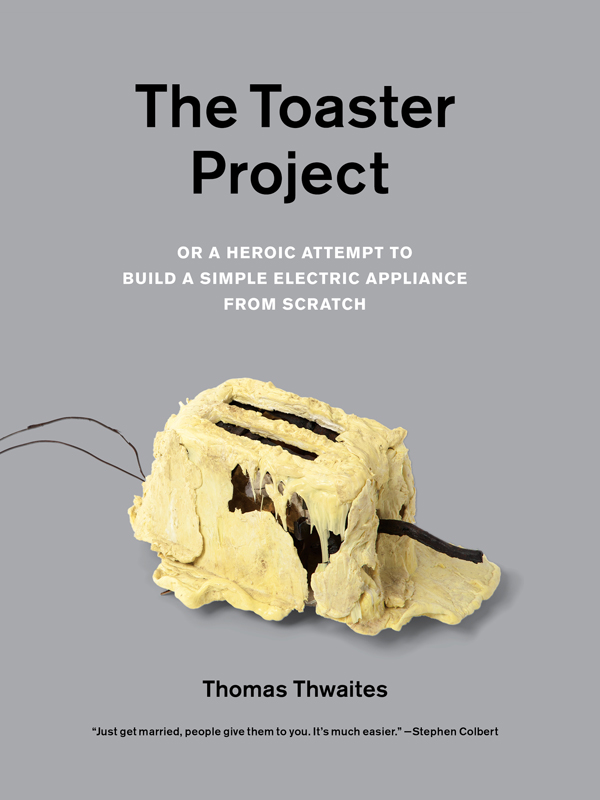
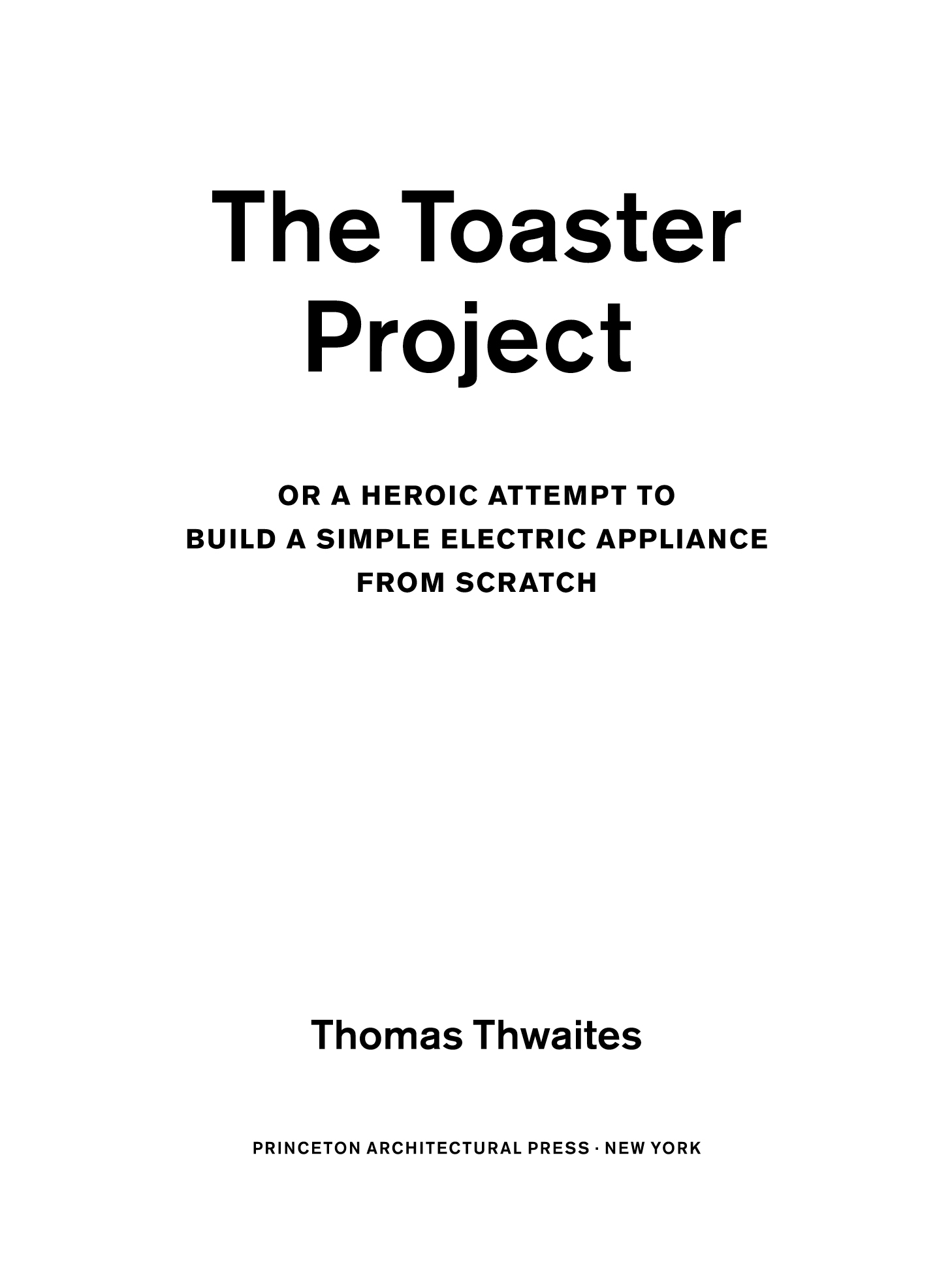
Left to his own devices he couldnt build a toaster. He could just about make a sandwich and that was it.
Douglas Adams, Mostly Harmless (1992)
For Merle, Bette,Vito & Felix
Published by
Princeton Architectural Press
37 East 7th Street, New York, NY 10003
For a free catalog of books call 1-800-722-6657
Visit our website at www.papress.com
2011 Thomas Thwaites
All rights reserved
14 13 12 11 4 3 2 1 First edition
No part of this book may be used or reproduced in any manner without written permission from the publisher, except in the context of reviews.
Every reasonable attempt has been made to identify owners of copyright. Errors or omissions will be corrected in subsequent editions.
Editor: Sara Bader
Designer print edition: Paul Wagner
Special thanks to: Bree Anne Apperley, Nicola Bednarek Brower, Janet Behning, Fannie Bushin, Megan Carey, Becca Casbon, Carina Cha, Tom Cho, Penny (Yuen Pik) Chu, Russell Fernandez, Jan Haux, Linda Lee, John Myers, Katharine Myers, Margaret Rogalski, Dan Simon, Andrew Stepanian, Jennifer Thompson, Joseph Weston, and Deb Wood of Princeton Architectural Press
Kevin C. Lippert, publisher
Library of Congress Cataloging-in-Publication Data
Thwaites, Thomas, 1980
The toaster project, or A heroic attempt to build a simple electric
appliance from scratch / Thomas Thwaites. 1st ed.
p. cm.
Includes bibliographical references.
ISBN 978-1-56898-997-6 (alk. paper)
ISBN 978-1-61689-119-0 (digital)
1. Thwaites, Thomas, 1980Themes, motives. 2. ManufacturesMiscellanea. I. Title. II. Title: Heroic attempt to build a simple electric appliance from scratch.
NK1447.6.T49A35 2011
683'.83dc22
2011006094
Foreword
by David Crowley
Where do the products that fill our lives come from? China is, of course, the standard answer to this question. The dragon economys mammoth factories are high in our consciousness, drawing the attention of environmentalists worried about the effects of breakneck industrialisation and Western politicians troubled about competition.
But China is an inadequate answer. Where do our things really come from? What lies behind the smooth buttons on your mobile phone or the elegant running shoes on your feet? What is involved in extracting and processing the materials that give themselves up from the earth so reluctantly? Where does the copper in your Made in China kettle come from? Were the electronic components and integrated circuits in your TV remote control assembled by machine or by hand? And what exactly has been integrated in that circuit anyway?
We rarely ask these kinds of questions. Perhaps the nature of our consumer culture makes us averse to them. Consumer goods play a clever game of hide and show with us: they call our attention, promising to satisfy our wants. Yet, at the same time, they veil their origins. Appearing to have no history or past, they materialise on the shelves of our shops as if by magic. This is what Walter Benjamin described as the phantasmagoria of commodity culture. Modern societies, it seems, not only forget the material and practical origins of the commodities they consume, they seem to have elevated them to minor deities.
In The Toaster Project Thomas Thwaites set himself the task of making one of the most commonplace consumer goods from scratch. This meant not assembling this modest appliance from other existing components but extracting and processing the materials from which the parts of a toaster are made. This book records his major failures and minor triumphs.
Thwaites begins his mission by dismantling the cheapest toaster on sale in the shops. This is an exercise in reverse engineering, the dark art practiced by military engineers trying to learn enemy secrets and copyright lawyers attempting to track down patent infringements. Thwaitess project rapidly becomes another kind of reverse engineering. Acting alone and eschewing the armoury of techniques available to modern industry, he finds himself in the position of late-medieval man with a limited repertoire of skills and expertise. His most effective guide to the task of smelting iron from ore is, for instance, not the latest issue of International Journal of Material Sciences but De re metallica , a sixteenth-century treatise.
Modern myths of omnipotence come to seem like hubris when Thwaites is defeated by the task of smelting metals, something first practiced eight thousand years ago. We know more now, dont we? We are more expert than our ancestors, arent we? Yet, at the same time, we are also reliant on the knowledge they produced. This is pointed out by the philosopher Michel Serres, in Conversations on Science, Culture, and Time ( 1995 ), when he asks us to consider a new car:
It is a disparate aggregate of scientific and technical solutions dating from different periods. One can date it component by component: this part was invented at the turn of the century, another, ten years ago, and Carnots cycle is almost two hundred years old. Not to mention that the wheel dates back to neolithic times. The ensemble is only contemporary by assemblage, by its design, its finish, sometimes only by the slickness of the advertising surrounding it.
Submerged in our toasters are layers of hard-won and deeply practical knowledgeif only we could tap it.
In the spirit of many recent endeavours to limit the techno euphoria of twenty-first-century modernity, Thwaites set some sharp restrictions on his project. Famously, Lars von Trier and Thomas Vinterberg called for filmmakers to return to first principles in their Vow of Chastity. The obligation to shoot on-site with actors, using natural sound and handheld cameras, would, they argued, ensure a cinematic purity that has been lost in the age of CGI (computer-generated imagery) and lowbrow cinema. Thwaitess particular holy vows seem simpleI must make all the parts of my toaster from scratch and I must make my toaster myselfbut like most rules, they require interpretation. Making a toaster on his own means not employing other people, but in the world today, can anyone ever really be entirely independent, forgoing the expertise and services of others? Surely thats the lonely territory of antimodern hermits like Theodore Kaczynski, author of another vow of chastity, The Unabomber Manifesto. The Toaster Project over timebecomes a social one: in the course of his quest, Thwaites makes willing conscripts of professors, press officers, and even amiable drunks.
In one regard, Thwaitess Toaster Project seems closer in spirit to von Triers Five Obstructions (2003) than the Vow of Chastity. In this documentary the Danish filmmaker set his friend and mentor, Jrgen Leth, the task of filmmaking under five impossible conditions. Failure was guaranteed, but what made the project worthwhile was Leths resourcefulness and imagination (as well as his attempts to stretch the rules). Making a toaster from scratch is surely an impossible task, but not a pointless one. Thwaitess project reveals much about the organisation of the modern world, not least the extent to which Britains industrial capacity has been dismantled. The countrys mines, foundries, and factories have become, it seems, another form of phantasmagoria.
Preface
Hello, my name is Thomas Thwaites, and I have made a toaster.
It took nine months, involved travelling nineteen hundred miles to some of the most remote places in the United Kingdom, and cost me 1187.54 ($1837.36) . This is clearly rather a lot of time, effort, and money expended for just an electric toaster, but when I say, I have made a toaster, I mean really made it, literally from the ground up; starting by digging up the raw materials and ending with an object that Argos sells for only 3.94 ($6.10) .

